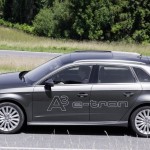What has Audi lined up in its future? Dr Nicholas Ind, author of Branding Inside Out, looks at its shift to electrification, something driven by the company’s engagement with its employees in strategic initiatives


Top: The Audi E-tron FE04, the company’s first all-electric racing car—part of a wider strategy. Above: More down to earth: the Audi Q7 E-tron SUV.
Many organizations have mechanisms for involving their employees in bringing a brand to life. Some are also adept at engaging their employees in innovation processes, however, allowing staff to influence strategic initiatives is less common—which is often seen as the preserve of senior managers. This is surprising in two respects. First, if the value of organizations is largely in their intangible assets, then it would seem to make sense to tap into the ideas, knowledge and skills of employees, not only to enact strategies but also to conceive them. Secondly, as the researchers Kaplan and Orlikowski show in their research study, employees can only deliver strategic initiatives that are plausible and coherent to them.¹ Rather than guessing the views of employees, it would thus be far better to involve them in strategy development to ensure that coherence.
In this context, it is interesting to note that car company Audi has a business strategy that has shifted towards embracing electric and hybrid vehicles. Given the long-term commitment of Toyota to hybrids, which goes back more than twenty years, and Tesla’s disruptive impact on the sector, since the launch of the Tesla Model S, this change might seem obvious, but what is interesting here is the catalyst. Audi has had a long history of using the term Vorsprung—which means getting ahead, or advancement. ‘Vorspung durch Technik’ was the slogan of its advertising campaigns in the UK for over 30 years (even though not everyone understood the meaning of the phrase) and the word Vorsprung encapsulates the company’s strategy. However, in the eyes of its German employees, Audi has not been getting ahead enough in terms of electrification and it was they who argued for a strategy based on a whole-hearted commitment towards electric vehicles. Until now, some traditional automotive manufacturers have been chary of making this shift because they feared undermining their core business, which they believe will remain dominant in the short-to-medium term. But with Audi, the typical picture of an ambitious, forward-looking management held back by a conservative workforce concerned with retaining the status quo, has been inverted.
What’s behind this? For starters, it’s an apt illustration of what Christoph Burmann and Rico Piehler call Brand Citizenship Behaviour—the willingness of employees to go beyond what their jobs specify to take initiatives that help to strengthen the brand. Employees help to build a brand when they identify with, and believe in, what the brand stands for. Employees—especially customer-facing ones—are also often closer to the reality of subtly shifting consumer attitudes and behaviour. Managers may see market research studies, but employees also acquire insight through online and offline conversations. Finally, there is clearly a concern among employees that Audi would suffer without a commitment to electric, and in turn, that would affect the employment prospects of its 88,000 employees. The widespread use of electric cars might seem a distant reality in some countries, but where I live—in Norway—the future is here. In September, more than 60 per cent of new car sales were either hybrid or electric.
The experience of Audi shows that companies can take advantage of the insights from employees and build them into strategic initiatives, but it requires a certain milieu—one where managers listen and recognize the competence and creativity of their people. As Oriol Iglesias and Fathima Saleem write, it requires ‘a new participatory leadership style that should be more empathetic, open and humble—and that also recognizes the need for active employee empowerment.’—Dr Nicholas Ind
Note
1. S. Kaplan and W. J. Orlikowski: ‘Temporal Work in Strategy Making’, Organization Science, vol. 24, no. 4, 2013, pp. 965–95.
Dr Nicholas Ind is an associate professor at Kristiania University College, Oslo, and a partner in Equilibrium Consulting. He is a member of the editorial board of the Journal of Brand Management and a founding member of Medinge Group, an international branding think-tank. Nicholas is the author of eleven books including Beyond Branding, Living the Brand and Brand Together (all published by Kogan Page), and Brand Desire with Oriol Iglesias (published by Bloomsbury). He also co-edited Brands with a Conscience, with Sandra Horlings. Branding Inside Out by Nicholas Ind is now available. Save 20 per cent with code BMKBI20 when you purchase the book from Kogan Page.










Leave a Reply